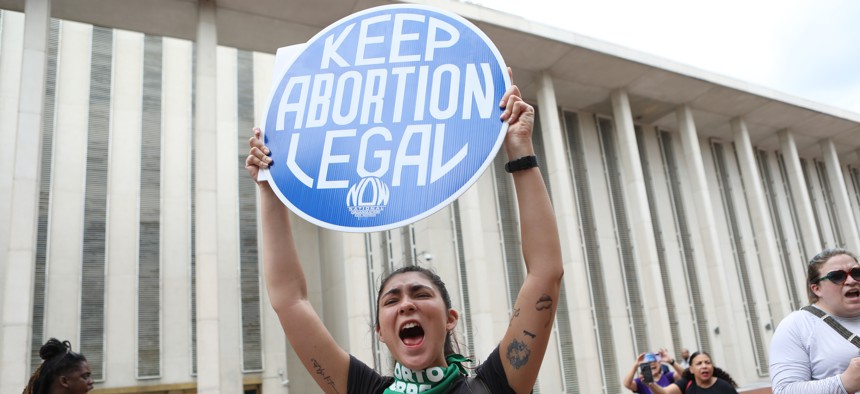Opinion
Bill Cotterell: Florida abortion amendment has a rough road ahead
If the initiative gets on the ballot, it will be the most talked-about issue of the campaign, our Capitol Columnist writes.

A protester outside the Florida Capitol where lawmakers were considering the now-passed 6-week abortion ban, April 3, 2023. The Washington Post via Getty Images
The whole idea behind amending Florida’s Constitution by collecting voter signatures on petitions is to make the state Legislature act, when House and Senate members are so bought-off by special interests, or afraid of some pressure group, that they ignore the will of the people.
There are two ways lawmakers get bought off. It’s usually done with money, through the legalized bribery system that’s euphemistically called “campaign finance.” The other way you can “buy” a legislator’s vote is by showing that you can deliver a win-or-lose bloc of votes at election time.
Previous column – Bill Cotterell: Republicans will come to regret winning on abortion
Related coverage –
- Abortion ban protesters – including Nikki Fried, Lauren Book – arrested, charged with trespassing outside Tallahassee City Hall
- Florida Senate passes 6-week abortion limit
- Abortion reporting rulemaking going forward
Last year, the U.S. Supreme Court lobbed the biggest political grenade since 1954 into state legislatures by rescinding constitutional protections for abortion choice and allowing each state to revise its laws. As they did with school integration 68 years earlier, mostly southern states responded with hasty, vindictive laws that immediately ran into court challenges at state and federal levels.
Having just enacted new strictures on abortion after 15 weeks of gestation that are still pending in the state Supreme Court, Florida lowered the bar to six weeks this year. Gov. Ron DeSantis signed the bill into law as part of his push to get to the right of Donald Trump among GOP voters.
All of which brings us to the Monday after the 2023 legislative session adjourned. That's when defeated, demoralized Democrats wearily rallied around a public petition campaign to inject a constitutional amendment into next year’s campaign. If they get their proposal on the ballot, win or lose, it will be the most talked-about issue of the campaign — maybe even hotter than the presidential and U.S. Senate races.
With their registration advantage of about a half-million, emphatic victories in the last few statewide races, and general polling trends, there’s little doubt the Republicans will carry Florida’s electoral votes next year. U.S. Sen. Rick Scott’s reelection looks certain. But recent polling also indicates that, while GOP legislators have gleefully imposed greater restriction on abortion, the public is headed the other way: Favoring choice by large margins.
Amending the state constitution is not easy — it shouldn’t be — so pro-choice forces have a long way to go and a short time to get there. And even if they win, the Republican-run Legislature finds ways to thwart public mandates. Restoration of voting rights for felons, a mandate to use a big hunk of land-development taxes for conservation and medicinal marijuana use were all approved by petition amendments, yet legislators tried to stifle the voice of the voters with weasel-worded implementing statutes.
Supporters of the abortion amendment need to gather about a million signatures to get on the ballot. It takes just under 900,000 but duplication, unregistered voters and other mistakes will wash out a certain segment of petitions. And they have to certify all those signatures by Feb. 1, which works out to about 4,000 a day.
That takes millions and millions of dollars, plus a massive network of volunteer and professional canvassers, fund-raisers, attorneys and political consultants.
Meanwhile, Attorney General Ashley Moody gets a shot at the thing. Early in the petition-gathering, she requests a ruling from the Supreme Court on whether the ballot summary is plain enough to inform voters what it means, and whether the amendment deals with a single subject. Moody is likely to be unfriendly to the amendment, with five of the seven justices appointed by DeSantis, so we can expect skepticism.
If the amendment escapes the court, and proponents get the required signatures (qualifying by a minimum threshold in at least half the state’s congressional district), the proposition will need 60% public approval at the polls in November 2024. That means every vote against it is worth 1.5 votes for it. Polls may show 60-plus-% opposition to DeSantis’ new six-week ban, but answering a poll question and voting are two very different things.
There are always a couple dozen petition campaigns languishing in the Division of Elections, most going nowhere. The process is supposed to be grassroots, true democracy in action, but campaigns that win have one (or both) of two things behind them — a popular statewide leader or some organizations with deep pockets.
Results in other states have shown pro-choice forces have strong public support, but the governor and political leadership in Florida will be running against them next year.
Bill Cotterell is a retired capitol reporter for United Press International and the Tallahassee Democrat. He can be reached at bcotterell@cityandstatefl.com.
NEXT STORY: Opinion: Richard Morgan at 92 – an appreciation
